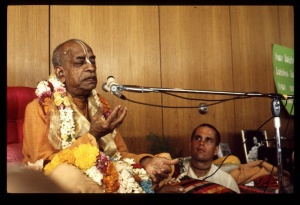CC Adi 17.73 (1975): Difference between revisions
(Vanibot #0027: CCMirror - Mirror CC's 1996 edition to form a basis for 1975) |
(Vanibot #0020: VersionCompareLinker - added a link to the Version Compare feature) |
||
| Line 2: | Line 2: | ||
<div style="float:left">'''[[Sri Caitanya-caritamrta (1975)|Śrī Caitanya-caritāmṛta (1975)]] - [[CC Adi (1975)|Ādi-līlā]] - [[CC Adi 17 (1975)|Chapter 17: The Pastimes of Lord Caitanya Mahāprabhu in His Youth]]'''</div> | <div style="float:left">'''[[Sri Caitanya-caritamrta (1975)|Śrī Caitanya-caritāmṛta (1975)]] - [[CC Adi (1975)|Ādi-līlā]] - [[CC Adi 17 (1975)|Chapter 17: The Pastimes of Lord Caitanya Mahāprabhu in His Youth]]'''</div> | ||
<div style="float:right">[[File:Go-previous.png|link=CC Adi 17.72 (1975)|Ādi-līlā 17.72]] '''[[CC Adi 17.72 (1975)|Ādi-līlā 17.72]] - [[CC Adi 17.74 (1975)|Ādi-līlā 17.74]]''' [[File:Go-next.png|link=CC Adi 17.74 (1975)|Ādi-līlā 17.74]]</div> | <div style="float:right">[[File:Go-previous.png|link=CC Adi 17.72 (1975)|Ādi-līlā 17.72]] '''[[CC Adi 17.72 (1975)|Ādi-līlā 17.72]] - [[CC Adi 17.74 (1975)|Ādi-līlā 17.74]]''' [[File:Go-next.png|link=CC Adi 17.74 (1975)|Ādi-līlā 17.74]]</div> | ||
{{CompareVersions|CC|Adi 17.73|CC 1975|CC 1996}} | |||
{{RandomImage}} | {{RandomImage}} | ||
==== TEXT 73 ==== | ==== TEXT 73 ==== | ||
<div class="verse"> | <div class="verse"> | ||
:nāme stuti-vāda | :nāme stuti-vāda śuni' prabhura haila duḥkha | ||
:sabāre niṣedhila, | :sabāre niṣedhila,--ihāra nā dekhiha mukha | ||
</div> | </div> | ||
| Line 18: | Line 17: | ||
<div class="synonyms"> | <div class="synonyms"> | ||
nāme—in the holy name of the Lord; stuti-vāda—exaggeration; | nāme—in the holy name of the Lord; stuti-vāda—exaggeration; śuni'-hearing; prabhura—of the Lord; haila—became; duḥkha—aggrieved; sabāre—unto everyone; niṣedhila—warned; ihāra—of him; nā—do not; dekhiha—see; mukha—face. | ||
</div> | </div> | ||
| Line 25: | Line 24: | ||
<div class="translation"> | <div class="translation"> | ||
When a student interpreted the glories of the holy name as a prayer of exaggeration, Śrī Caitanya Mahāprabhu, greatly unhappy, immediately warned everyone not to see the | When a student interpreted the glories of the holy name as a prayer of exaggeration, Śrī Caitanya Mahāprabhu, greatly unhappy, immediately warned everyone not to see the student's face henceforward. | ||
</div> | </div> | ||
| Line 32: | Line 31: | ||
<div class="purport"> | <div class="purport"> | ||
When Śrī Caitanya Mahāprabhu explained the glories of the transcendental potency of the Lord's holy name, the Hare Kṛṣṇa mahā-mantra, one unfortunate student said that such glorification of the holy name was an exaggeration in the śāstras to induce people to take to it. In this way the student interpreted the glories of the holy name. This is called artha-vāda, and it is one of the ten offenses at the lotus feet of the holy name of the Lord. There are many kinds of offenses, but the offense known as nāma-aparādha, an offense at the lotus feet of the holy name, is extremely dangerous. The Lord therefore warned everyone not to see the face of the offender. He immediately took a bath in the Ganges with all His clothes to teach everyone to avoid such a nāma-aparādha. The holy name is identical with the Supreme Personality of Godhead. There is no difference between the person God and His holy name. This is the absolute position of the Supreme Personality of Godhead. Therefore one who distinguishes between the Lord and His name is called a pāṣaṇḍī, or nonbeliever, an atheistic demon. Glorification of the holy name is glorification of the Supreme Personality of Godhead. One should never attempt to distinguish between the Lord and His name or interpret the glories of the holy name as mere exaggerations. | |||
</div> | </div> | ||
Latest revision as of 16:45, 26 January 2020

A.C. Bhaktivedanta Swami Prabhupada
TEXT 73
- nāme stuti-vāda śuni' prabhura haila duḥkha
- sabāre niṣedhila,--ihāra nā dekhiha mukha
SYNONYMS
nāme—in the holy name of the Lord; stuti-vāda—exaggeration; śuni'-hearing; prabhura—of the Lord; haila—became; duḥkha—aggrieved; sabāre—unto everyone; niṣedhila—warned; ihāra—of him; nā—do not; dekhiha—see; mukha—face.
TRANSLATION
When a student interpreted the glories of the holy name as a prayer of exaggeration, Śrī Caitanya Mahāprabhu, greatly unhappy, immediately warned everyone not to see the student's face henceforward.
PURPORT
When Śrī Caitanya Mahāprabhu explained the glories of the transcendental potency of the Lord's holy name, the Hare Kṛṣṇa mahā-mantra, one unfortunate student said that such glorification of the holy name was an exaggeration in the śāstras to induce people to take to it. In this way the student interpreted the glories of the holy name. This is called artha-vāda, and it is one of the ten offenses at the lotus feet of the holy name of the Lord. There are many kinds of offenses, but the offense known as nāma-aparādha, an offense at the lotus feet of the holy name, is extremely dangerous. The Lord therefore warned everyone not to see the face of the offender. He immediately took a bath in the Ganges with all His clothes to teach everyone to avoid such a nāma-aparādha. The holy name is identical with the Supreme Personality of Godhead. There is no difference between the person God and His holy name. This is the absolute position of the Supreme Personality of Godhead. Therefore one who distinguishes between the Lord and His name is called a pāṣaṇḍī, or nonbeliever, an atheistic demon. Glorification of the holy name is glorification of the Supreme Personality of Godhead. One should never attempt to distinguish between the Lord and His name or interpret the glories of the holy name as mere exaggerations.